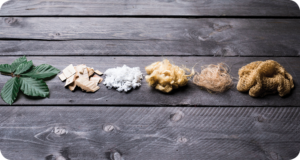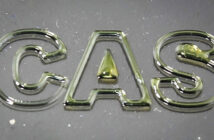
“Our biogenic packaging solutions combine the highest standards of freshness with respect for the environment and are particularly suited to the food industry.These solutions go by the name of Packnature,” says VPZ.
The company says that by using compostable and recyclable packaging not only limits the drain on fossil fuels, such as crude oil, but also allows biodegradable substances to enter the supply chain. VPZ has managed to develop compostable tube netting for fruit and vegetables. The basis for the fresh ‘net’-work: Lenzing Modal cellulose fibres.
“Over the past few decades, the packaging industry has been focused on plastic – even for organic produce. However, a growing number of consumers now want to buy their organic vegetables in organic packaging, too. VPZ’s compostable Packnatur tube netting made from beechwood cellulose has been in use since 2013.
Austria’s leading supermarket chains and organic fruit and vegetable producers use Lenzing Modal nationwide for the organic fruit and vegetables. This has meant that potatoes, onions, citrus fruits, beetroot and black radishes are all members of today’s fresh ‘net’-work. There are many factors that need to be considered when manufacturing environmentally friendly products, including their production and decomposition.
In an ideal world, manufacturing uses locally sourced recycled materials as raw materials, which are put to a worthwhile intermediary use before their energy is recovered. The raw material used in Packnatur cellulose tube netting is beechwood, which is recovered from forest thinning in central Europe (1/3 from Austria, 2/3 from central Europe, from certified forestry). This is transformed into modal fibres by Lenzing AG – the global market leader in the environmentally friendly manufacturing of cellulose fibre – using carbon-neutral processes in line with the strictest environmental standards. The production of raw materials, therefore, does not compete with the production of food, and avoids the need for irrigation or the use of chemicals on farmland. Fibres should be manufactured as environmentally friendly as possible, while keeping transport distances to a minimum, so that fossil resources are used as little as necessary. VPZ’s compostable Packnatur cellulose tube netting fulfils all of these criteria.
The breathable natural nets keep consumers’ produce fresher for 2 or three days longer and prevents the premature sprouting of potatoes and onions. The packaging is soft to the touch and looks very natural. A special dying process allows the modal fibres to be coloured using a minimum of dye. The net is current available in the standard colours of white, beige, lemon yellow, orange, mandarin, red, Bordeaux, green, dark brown and black. The Packnatur cellulose netting is compostable, allowing it to re-enter the food life cycle. Food that is no longer fit for sale can be disposed of in its packaging.
Besides the standard packaging range, VPZ also sells biodegradable packaging such as cellulose tube netting, natural fibre sacks, groundwood packaging, disposable tableware made from sugar cane bagasse, starch packaging, disposable wooden cutlery and an extensive range of paper packaging.” Our creativity knows no bounds when it comes to developing new, environmentally friendlier concepts for product packaging.
“Today, 84% of our products are – naturally – of biogenic origin. Deriving foam from seaweed, biopolymers from agricultural waste or netting from cellulose fibres has nothing to do with science fiction. These are actual research projects that VPZ has been working on since 1992.”




























































































